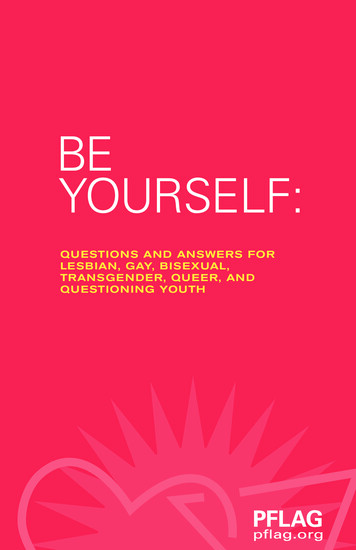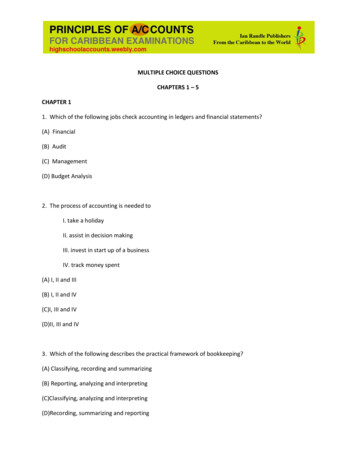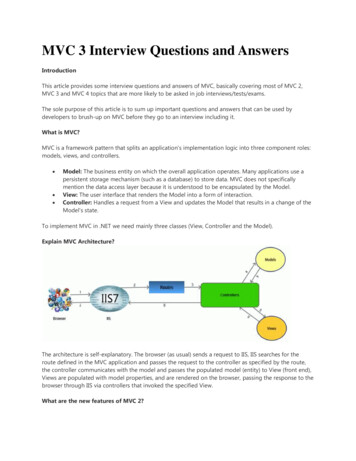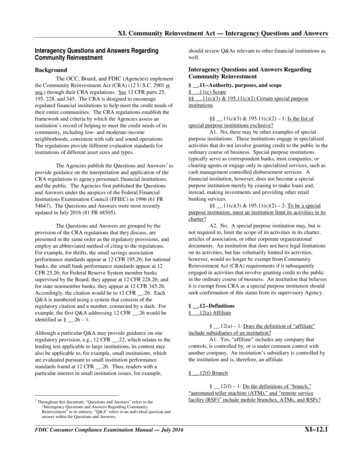
Transcription
QU ESTIONS AN D ANSWE RS F ORLESB IAN, GAY, B ISEXUAL,TRANSG E N DE R, QU E E R, AN DQU ESTION I NG YOUTH
We encourage you to immediately seek out help if you ora loved one needs it, especially if you or a loved one arein danger or have thought about self-harm in any way.For LGBTQ youth, please contact The Trevor Projectonline at thetrevorproject.org/pages/get-help-now,or call one of the following:HelplinesThe Trevor Project:(866) 488-7386National Suicide Prevention Lifeline:(800) 273-8255Ali Forney Day Center:(212) 206-0574Center for Disease Control and Prevention (CDC) Info:(800) 342-AIDS (2437)Spanish service:(800) 344-7432TDD service for the deaf:(800) 243-7889[10:00am till 10:00pm EST, Monday through Friday]The Gay, Lesbian, Bisexual and Transgender National Hotline:(888) 843-4564The GLBT National Youth Talkline (youth serving youththrough age 25): (800) 246-7743The National Runaway Switchboard:(800) RUNAWAY (786-2929)
Founded in 1972 with the simple act of a mother publicly supporting hergay son, PFLAG is the nation’s first and largest organization for lesbian,gay, bisexual, transgender, and queer (LGBTQ ) people, their parents andfamilies, and allies. PFLAG has over 400 chapters and 200,000 members andsupporters crossing multiple generations of families in major urban centers,small cities, and rural areas across America. This vast grassroots network iscultivated, resourced, and supported by the PFLAG National office (locatedin Washington, DC), the National Board of Directors, the Regional DirectorsCouncil, and our many advisory councils and boards. PFLAG is a nonprofitorganization not affiliated with any political or religious institution.Our Vision. PFLAG envisions aworld where diversity is celebratedand all people are respected, valued,and affirmed inclusive of their sexualorientation, gender identity, andgender expression.Our Mission. Our mission is tobuild on a foundation of lovingfamilies, united with LGBTQ peopleand allies, who support one another,as well as educate ourselves and ourcommunities to speak up as advocatesuntil all hearts and minds respect,value and affirm LGBTQ people.About this publication:Be Yourself: Questions & Answers for Lesbian, Gay, Bisexual, Transgender,Queer, and Questioning Youth is copyrighted. For reprint permission, pleasecontact the PFLAG National office, info@pflag.org, (202) 467-8180.All Rights Reserved. 2019 PFLAG, Inc.Written by: Rachel Lichtman, Liz Owen, Ryan SasseContent/Editorial Review: Robert Bernstein, John R. CepekDr. Kay A. Heggestad, MD, Jody M. Huckaby, Ellen James, Elizabeth Kohm,Jean-Marie Navetta, Diego Sanchez, APR.
INTRODUCTIONSexual orientation, gender identity, and gender expression arecomplex concepts and discovering your own unique identity can beconfusing. Deciding to come out as LGB or queer—or disclosingyourself as transgender—can be challenging and puzzling, and leaveyou filled with questions.Maybe your friends and family haveThink about it: you’re becoming antalked to you about dating, falling inadult, which can feel both excitinglove, and getting married. But theyand frustrating, especially when youdon’t yet have an adult’s rights. You’re probably have never talked aboutwhat happens when a boy falls in lovebecoming more independent, andwith another boy oryour relationshipRealizing that I’m notabout what you canwith your parents,straight was the leastdo when your physiguardians, orexpected thing to happencal anatomy justfamily membersto me. One night I wasdoesn’t “match up”is changing. It’s ajournaling, and withoutwith how you feelnew experience forinside. In fact, a lotthem; they’re learn- thinking, wrote down “I’mbisexual”. Since then, I’veof what you’ve hearding to accept thatrealized that I don’t reallyabout LGBTQ you’re not a littlelike labeling myself.people might havechild anymore.- Anonymous, 16, Cleveland, Ohiocome from people atThen, all of aschool, where “gay,”sudden, your peers“lesbian,” “queer,”realize that the opposite sex isn’t that“fag,” “dyke,” and “tranny” are wordsbad and couples start popping up allsometimes used to harass and insultover school. Soon such relationshipsother people; you may even havemight seem like the most importantexperienced this discriminatory lanthings in the world.guage within your own family.But what if you can’t relate? If you’rea teen who is lesbian, gay, bisexual,transgender, queer, or gender expansive—or wondering if you are—youmay feel unprepared,uninformed, and even excluded.4BE YOURSEL FOur culture is dominated byheterosexual and genderconforming images and messages.Television, movies, and magazinesmostly show men and womentogether, most music is about fallingP F L AG . O R G
in love with someone of the oppositesex, and many of your friends areprobably talking about the oppositesex. And, while most people yourage seem to fit neatly into expected gender roles, you may feel youdon’t—or don’t want to.especially if your community isn’texactly LGBTQ -friendly.However, there are ways to reachout to other LGBTQ young people. If you call any of the numbersat the back of this book or log onto any of the websites listed, youcan reach thousands of other youthThis publication aims to helpwho have already gone through, oryou understand yourself and theare currently going through, theirLGBTQ community by answeringown journeys of self-discovery.some of your questions and recThey are people with whom you canommending supportive resources.talk openly, compare unique lifeThe questionsexperiences, andother youth haveOnce I came to terms withseek advice.asked about beingbeing male, I felt so muchLGBTQ shapebetter. I accepted who I amObviously, thisthis publication;and immediately wantedpublication cannotwe hope it will helpothers to do the same.ask or answeryou find answers of - Anonymous, 15, Jasper, Georgiaevery question, butyour own.we hope it givesyouaplacetostart.You don’t haveThree important points:to be alone when learning about andidentifying your sexual orientationOne: There is nothing wrong withor gender identity/expression. Thebeing LGBTQ ; it’s as normal asresources beginning on page 39 willbeing left-handed. It’s just anothergive you a place to continue yourpart of who you are. Everyone has asexual orientation, a gender identity, own journey—to find information, tofind answers, to find friends, and toand a gender expression.get support.Two: It takes time to know who youare. It’s okay to be confused, it’s okay Our best advice? Be yourself. If youare LGBTQ , you’ll soon find thatto be unsure, and it’s okay to takeyou have the power to shape andyour time finding out. There’s nodefine your identity and the way youneed to rush the process.choose to express it.Three: You’re not alone. RightWhile coming out will present younow, there are tens of thousandswith questions and situations youof out LGBTQ youth, andhave never faced before, you’ll alsothousands more who arefind great joy and comfort in thewondering if they are LGBTQ journey of self-discovery.too. It may seem hard to imagine,P FLAG.ORGB E YO U R S E L F5
FREQUENTLYASKED QUESTIONSDANGER/SELF-HARM I am in danger, andsometimes think ofharming myself.I need help! 6I have a crush on someoneat my school. How can Itell if they’re LGB too?GENDER IDENTITY/EXPRESSION What’s the differencebetween sexual orientation,gender identity, and genderexpression? I think I might be lesbian,gay, or bisexual. How do Iknow for sure?What’s the differencebetween being transgenderand being transsexual? How can I be sure of mysexual orientation if I’mnot sexually active?When do transgenderpeople know that they aredifferently gendered? I thought LGB people act acertain way. If I don’t fit thestereotype, am I still LGB?What is the typicaltransition process fortransgender people? What does it mean tobe gender expansive ornonbinary, and how is thatdifferent from identifyingas transgender?SEXUAL ORIENTATION How do people becomestraight, lesbian, gay,bisexual, or otherorientations?I have a crush on my samesex best friend. Does thismean I’m LGB?BE YOURSEL FP F L AG . O R G
Aren’t there only twogenders? I think I might betransgender or genderexpansive. How do I knowfor sure?MENTAL HEALTH Is being lesbian, gay, orbisexual a mental disorder? Is being transgender amental disorder? What about “ex-gay”ministries and so-called“conversion therapy”—canthey help me?THE LGBTQ COMMUNITY I don’t see other LGBTQ people around me. Am Ithe only LGBTQ personin my community?Sometimes I don’t seemyself reflected in theLGBTQ community. Arethere resources for youthof color?P FLAG.ORGCOMING OUT Should I come out? How should I come out? Should I come out to myparent(s) or guardian(s),and how should I do it? I can’t come out to myparent(s) or guardians(s).Whom should I tell? Will people accept me afterI come out? Will I lose my nonLGBTQ friends? Wherewill I find LGBTQ friends? Can I have a family of myown? I feel so alone, are therepeople I can talk to?STAYING SAFE What if I’m harassed atschool? What if I’m harassedoutside of school? Do I need to worry aboutHIV/AIDS?B E YO U R S E L F7
DANGER/SELF-HARMI am in danger, andsometimes think of harmingmyself. I need help!THE SHORT ANSWER: If youare in crisis or thinking aboutself-harm or suicide, you needimmediate support. Pleaseturn to the inside front cover ofthis publication for importantcontact information to get thehelp you need.You are a unique person, worthyof love, friendship, and support.Regardless of how you identify orwhom you love, you have the rightto feel safe and secure. If you feelunsafe, if you feel unsure, if you feellike you have nowhere to turn, thereare people who can help.SEXUAL ORIENTATIONHow do people becomestraight, lesbian, gay, bisexual,or other orientations?THE SHORT ANSWER: No onereally knows for sure. However,the vast majority of credibleprofessional experts believe thatsexual orientation is not a choicebut rather part of our humancondition, like handedness.people are LGB. Most experts believethat we are born with our sexualorientation—a concept called the“nature” argument. Other believe thatbeing LGB is a choice, influenced byupbringing, cultural influences, andother external factors—the “nurture”argument. And some believe it isa combination of both nature andnurture. Regardless of how our sexualorientation develops, the majorityof evidence states that it is nearlyimpossible to change.The American PsychologicalAssociation (APA) is the largestassociation of psychologistsworldwide. In its online PsychologyHelp Center, which discusses “Sexualorientation, homosexuality andbisexuality,” the APA confirms itsstance—declared publicly in 1975—that: “.most people experience littleor no sense of choice about theirsexual orientation.” The APA goes onto explain that sexual orientation iscreated by a complicated mixture ofgenetics, hormones, development, andinfluences both cultural and social;no single factor solely determinesone’s sexual orientation. To read moreabout health, emotional awareness,and sexuality, visit the APA’s OnlineHelp Center at r, everyone has a sexualorientation. There is more than oneschool of thought about why some8BE YOURSEL FP F L AG . O R G
I think I might be lesbian,gay, or bisexual. How do Iknow for sure?THE SHORT ANSWER: You’llknow when you know. It couldtake a while, and it’s OK toremain unsure. There’s noneed to rush.There are hundreds of differentways to realize you are not straight.Some LGB people say that fromthe time they were very young theyjust “felt different” or “just knew”they weren’t like their friends. Somedidn’t share the same opposite-sexgrade-school crushes and some weremore interested in their same-sexclassmates.If you think you’re LGB, try not tohide your feelings from yourself.Yes, figuring out who you are canbe stressful, emotional, and a littlescary—you may not want to dealwith it—but taking some time aloneto think about how you feel is the firststep toward accepting yourself. Giveyourself permission to explore yourthoughts, feelings, and emotions.Remember, everyone is unique andwonderful in their own way.How can I be sure of mysexual orientation if I’m notsexually active?THE SHORT ANSWER:You don’t need to have sex todiscover who you are. It is theattraction that helps determinesexual orientation.People who are LGB often say ittook a while to put a name to theirfeelings. Once they learned whatbeing LGB was, it started to makeIt’s important to know that you don’tsense to think about their ownhave to have had a sexual experiencesexual orientation in those terms.to know thatIt fit with theyou’re lesbian,feelings they’dSince first realizing threegay, or bisexual.had whileyears ago that I am bisexual,Most peoplegrowing up.and coming out to most ofexperiencemy family and friends in thecrushes whenMany don’t beginintervening years, I havethey are quiteto think aboutgrown tremendously as ayoung, beforetheir sexualperson. I am on my way tothey becomeorientation untilliving a more authentic life.sexually active.they’re teenagers- Lauren O., 24, Frisco, TexasThink aboutor adults. Thisyour own pastis completelycrushes: Your feelings and yournormal. We figure out our identitiesemotional and physical attractionsin our own time—sometimes it takeswill help tell you who you are.months, other times it takes decades.P FLAG.ORGB E YO U R S E L F9
I thought LGB people act acertain way. If I don’t fit thestereotype, am I still LGB?THE SHORT ANSWER:Ignore the stereotypes. Somepeople fit them, some peopledon’t.People who are LGB, like peoplewho are straight, can act in manydifferent ways, and might or mightnot fit stereotypes. If you don’t fita common stereotype for an LGBperson, it doesn’t mean you’re notreally LGB—there is a wide rangeof diversity within that community,just as there is throughout every partof society. People use stereotypesto help them understand whatto expect from certain groups ofpeople. However, some stereotypesstem from a lack of experience withthe type of person in question orfrom ignorance or prejudice, andare simply incorrect. For example,you might hear that gay men aren’tstrong or athletic. Or that lesbiansappear or act more masculine. Butthese are stereotypes, and aren’t onesize-fits-all. Visit lgbthistorymonth.com for a searchable database ofLGB icons and note the diversity ofthe people listed there.Bottom line: Don’t worry about thestereotypes, and don’t let labels defineyou. There are as many different waysto express your LGB identity as thereare people in this world.10BE YOURSEL FRemember: you don’t need to proveanything to anybody. Be yourself.I have a crush on my samesex best friend. Does thismean I’m LGB?SHORT ANSWER: Notnecessarily.Enjoying intimate experiences—likecuddling, kissing, or holding hands—with someone of the same sex doesn’tautomatically mean you’re lesbian,gay, or bisexual, just as enjoyingintimate experiences with someone ofthe opposite sex doesn’t automaticallymean you’re straight.Many people develop crushes onsomeone of the same sex at somepoint in their lives, and we oftenexplore or identify with differentgender roles and expectationsthroughout our lives. ManyLGB people have some sexualexperiences with someone of theopposite sex, and many non-LGBpeople have some same-sex sexualexperiences. Those who enjoy suchexperiences with both sexes oftenidentify as bisexual. However,sometimes it takes some trial anderror to determine what we like andwhat we don’t like.Think of sexuality as a range, or“sexual continuum.” At one end ofthe range are many people who areattracted only to the same sex. AtP F L AG . O R G
the other end of the range are manypeople who are attracted only to theopposite sex. And in between arepeople who are attracted to both sexesin varying degrees.person based on hurtful and oftenunsupported stereotypes (see ouranswer to “I thought LGB peopleact certain ways. If I don’t fit astereotype, am I still LGB?”).People sometimes joke about havingAgain, remember that our sexuality“gaydar,” a “radar”develops overthat senses whotime. Don’tWhen I was a sophomore inis LGB. Figuringworry if youhigh school I realized thatout if someonearen’t sure. Yourmy attraction to girls wasis LGB if they’reearly years are astronger some ordinarynot completelytime of learning,“girl crush.” I didn’t thinkout is like figuringbit by bit, whatI could be gay because Iout if someoneworks for you,am very feminine. I loveis interested inand crushes andfashion and makeup, andit was hard for me to pushyou: Sometimesexperimentationpast the stereotypes.you can tell,are often part of- Rachel, 17, Highland Park,sometimes youthat process. OverNew Jerseycan’t. It can betime, you’ll findan extremelythat you’re drawnfrustrating and stressful process,mostly to men, women, or both—orbut it is part of getting to know theneither!—and then you’ll know. Youpeople around you. It takes time anddon’t have to label yourself.sometimes more patience than youthink you might have!I have a crush on someoneat my school. How can I tellif they’re LGB too?THE SHORT ANSWER:You can’t definitely, withoutasking—which presents itsown unique challenges.It’s impossible to know for surewhether someone identifies asLGB just by looking at them. Weshouldn’t assume people are LGBbecause of the way they look,dress, or act. Doing so would meanmaking assumptions about theP FLAG.ORGAsking your friends or theirs won’tguarantee an accurate answer. Andwhile you can casually observethem to try to find some clues—dothey have pro-LGBTQ stickers ontheir backpack or locker? Are theya member of the Gay-Straight orGender-Sexuality Alliance (GSA)at your school?—these things meanthat they may be LGB, or theymay be a supportive ally. The onlyway to find out someone’s sexualorientation is to talk to them aboutit directly. However, it’s extremelyimportant to respect anotherB E YO U R S E L F11
person’s privacy. They may not wantto talk about it, could be upset thatyou asked them, or may not want tobe recognized as LGB. As a generalrule, be very careful when askingsomeone such a personal questionunless you know them very well,and even then, be sensitive to theother person’s privacy. Approachthem the way you would want to beapproached about the subject.Remember, you can’t expect someoneelse to come to terms with theirsexual orientation any more quicklythan you are coming to terms withyour own. But be patient. One day (ifit hasn’t happened already), someonewill have a crush on you and they willbe wondering whether you’re LGB orstraight (or neither!) too.GENDER IDENTITY/EXPRESSIONWhat’s the differencebetween sexual orientation,gender identity, and genderexpression?THE SHORT ANSWER: Everyperson in the world has a sexualorientation, gender identity,and gender expression. Onedescribes our sexual attractions;one describes our internalfeeling or sense of being male,female, some combinationof both, or neither; and onedescribes how we presentourselves outwardly to others.12BE YOURSEL FIt’s pretty common for people tosee the acronym ‘LGBTQ ’ andthink it’s all about sex or sexualorientation. But it’s not! The‘transgender’ portion of the acronymrepresents gender identity and iscompletely separate from sexualorientation and sexual behavior.Many people think that alltransgender people or all peoplewith expansive or creative genderexpressions are lesbian, gay, orbisexual. They aren’t!In fact, just as each of us has asexual orientation (straight, gay,bi, asexual, pansexual, etc.), we allhave a gender identity and a way ofexpressing it. Our gender identityis how we feel inside about being agirl, a boy, somewhere in between,or neither; our gender expression ishow we dress and act to express orcommunicate our gender outwardly(which may or may not correlatewith our gender identity); andour sexual orientation describesto whom we are attracted. Sexualorientation is separate and distinctfrom gender identity, and genderexpression is separate and distinctfrom both sexual orientation andgender identity.P F L AG . O R G
What’s the differencebetween being transgenderand being transsexual?THE SHORT ANSWER:Transsexual people often, butnot always, use medicine andsurgery to help their bodiesmatch their gender identity,while many transgenderpeople do not.The words ‘transgender’ and‘transsexual’ do have one thing incommon: they are both adjectives(used to describe something) notnouns (used to identify something).Just as you wouldn’t say someoneis “gayed” or “straightened,” sotoo you wouldn’t say someoneis, or has been, “transgendered.”Saying “Alice is a person who istransgender” is correct—just likesaying “Alice is blonde”—but saying“Alice is a transgender” or “Alice istransgendered” is not. Using theseadjectives as nouns or verbs isconsidered offensive, so avoid usingthem in those ways.The term ‘transgender’ describesa person’s gender identity thatdoes not necessarily match theirassigned sex at birth. This word isalso sometimes used as an umbrellaterm to describe groups of peoplewho transcend conventionalexpectations of gender identity orWhen do transgenderexpression. ‘Transsexual’ is a lesserpeople know that they areused term (considered by some todifferently gendered?now be outdated) which refers toTHE SHORT ANSWER:people who are transgender whoOne’s sense of genderuse (or consider using) medicalhappens at different times forinterventions such as hormonedifferent people.therapy and/or surgery as partof the process of expressing theirMany transgender peoplegender. Transgender people may orremember “feeling different” frommay not decide to alter their bodiestheir earliesthormonally and/childhoodor surgically“When I came out to mymemories.to matchparents as transgender,But because oftheir genderit was after thought andstigma and lackidentity. For fulldebate.I was tired ofof information,definitions ofhiding myself at homethey can struggleboth terms, visitand pretending beingfor many yearsthe glossary atmisgendered didn’tto accept thisthe back of thisdifference. Asbother me.” publication.more information- Anonymous, 17, Madison, WIfor transgenderP FLAG.ORGB E YO U R S E L F13
people becomes available, we areseeing transgender people openlyexpressing their true genderidentity at younger ages.What is the typicaltransition process fortransgender people?THE SHORT ANSWER:There is no “typical”transition process, becausethere are many different waysto transition.For transgender people,transitioning means differentthings. For some, it means medicaltreatments, including use ofhormones and gender-affirmingsurgeries. For others, it means socialtransition, which might includethings such as choosing a new nameor altering outward appearancewith clothing or hairstyles. Thereis also legal transition, which isthe process of changing namesand gender markers on importantlegal documents such as a birthcertificate, passport, or socialsecurity card. And for still others, itmeans a combination of some or allof the above.What does it mean tobe gender expansive ornonbinary, and how is thatdifferent from identifyingas transgender?14BE YOURSEL FTHE SHORT ANSWER:Identifying as transgender versusidentifying as gender expansive,genderqueer, or other terms (seethe glossary at the back of thisbook) are different things. Thefirst relates to gender identity;the latter more usually relates togender expression.Gender-expansive individualsare generally those whose genderexpression is different from thesocietal expectations based ontheir assigned sex at birth. Just aswith transgender people, genderexpansive people may or maynot identify as transgender, male,female, both, or neither.Nonbinary people (sometimescalled ‘enby’ or ‘genderqueer’)identify outside of the genderbinary of being either a manor a woman. They may thinkof themselves as both man andwoman, neither man nor woman,moving between two genders, or asa third gender altogether. Refer tothe glossary at the back of this bookfor more terminology.Aren’t there only twogenders?THE SHORT ANSWER: No.While we used to think ofgender as binary—masculine/man/male and feminine/woman/female—we have cometo learn that gender exists moreP F L AG . O R G
on a spectrum. This is a newconcept in the United States, butmany cultures recognize morethan two genders and have for along time.In American Indian (AI) and AlaskaNative (AN) communities, thereare Two Spirit individuals whoidentify as having both a male and afemale essence or spirit. In India andBangladesh there is a third gendercalled “Hijra” that is neither malenor female. The Fa’afafine are a thirdgender in Samoa. Learn more abouthow other cultures perceive genderfrom this interactive map—andsupplementary materials—from -spirits map-html/.I think I might betransgender or genderexpansive. How do I knowfor sure?THE SHORT ANSWER:You’ll know when you know.It could take a while, and itis okay to remain unsure.There’s no need to rush.There are hundreds of different waysto discover your internal sense ofgender and how you want to expressyour gender. Some people say thatfrom the time they were very youngthey “felt different” or “just knew”they weren’t like their friends,rejecting the stereotypical gendercharacteristics theyThere is a wholewere “supposed” toI came out to everyonerange of identitiesdisplay.at my school’s first-everto be found on theGSA meeting instead ofgender spectrum.Some transgendergiving my feminine birthThroughout ouror gender-expansivename,Iintroducedmyselflives, we canas Elijah and admitted thatpeople say it took aexperience andI was trans. I rememberwhile to put a nameexpress our gendertrembling with fear butto their feelings—itin a variety ofeveryone was brilliantlywasn’t until theyways. Our genderaccepting.learned what theexpression can- Anonymous, 16,terms meant that itchange over timeOlmsted Falls, Ohiomade sense to thinkas we have newabout their genderexperiences andidentity and/or expression in thosebecome aware of new ideas.terms; it fit with the feelings they’dRemember, gender is a label createdhad while growing up.by people. Labels like gender are usedMany other people don’t begin toto help us figure out what to expectfigure out their gender identity untilfrom one another. They aren’t set inthey’re teenagers or adults. This isstone, and there is no right or wrongcompletely normal. We figure outgender to have or express.our identities in our own time—P FLAG.ORGB E YO U R S E L F15
sometimes it takes months, othertimes it takes decades.As with sexuality, some people knowtheir gender identity from an earlyage, and know that it doesn’t matchthe “boy” or “girl” label they wereassigned at birth. For others, genderidentity develops and changes overtime. If you feel that your genderidentity does not match up with the“boy” or “girl” label others assumeyou to have, it is completely normalto explore and learn about otherways to express yourself.Try not to hide your feelings fromyourself. Yes, figuring out who youare can be stressful, emotional, anda little scary—you may not want todeal with it—but taking some timealone to think about how you feelis the first step toward acceptingyourself. Give yourself permission toexplore your thoughts, feelings, andemotions. Remember, everyone isunique and perfect in their own way.MENTAL HEALTHIs being lesbian, gay, orbisexual a mental disorder?THE SHORT ANSWER:Absolutely not.The American PsychiatricAssociation declared in 1973that homosexuality is not amental disorder or disease, and16BE YOURSEL Fthe American PsychologicalAssociation says that it would beunethical to try to change a person’ssexual orientation. Often referredto as “conversion therapy” or“reparative therapy,” it is a harmfulpractice that has been banned innumerous states, with even morestates looking at bans. See the nextpage for more information.Is being transgender amental disorder?THE SHORT ANSWER:Absolutely not.Being transgender or genderexpansive is not a disorder. It isimportant to know, though, that inJuly 2012, the American PsychiatricAssociation (APA) removed thediagnostic term ‘gender identitydisorder’ from the Diagnosticand Statistical Manual of MentalDisorders (DSM) and replaced itwith ‘gender dysphoria,’ in the newedition, published in May 2013. TheDSM says that gender dysphoriacan be diagnosed when a person’sgender identity/expression is differentfrom their assigned gender at birthand at the same time associatedwith “clinically significant distressor impairment” in their social life,career, or other important areas oflife. As a result of such distress, thosewith untreated gender dysphoriahave a “significantly increased riskof suffering.” However, genderP F L AG . O R G
dysphoria narrows treatment to thosewho experience distress over theirgender incongruity.Because sexual orientation andgender identity are not chosen, youcannot “change your mind” or “praythe gay away” if you are LGBTQ .Therefore, gender dysphoria isn’tAfter all, did our non-LGBTQ about simplyfriends and lovedbeing genderones chooseI was raised in a Christianexpansive. Itto be nonhome, so homosexuality washas to do withLGBTQ ? Theseoff limits. I tried so hard to bethe absencemeasures havestraight, but it just didn’t feelor presence ofbeen proven toright. After having a boyfriendsuffering andcause seriousfor three months, I just gavediscomfort adamage andup and came out. Now I haveperson mightpotentially direa girlfriend and I am ecstatic.feel if they areconsequences- Anonymous, 20,unhappy orfor the patientsBloomington, Indianauncomfortableinvolved.with theirgender identity or incongruity. AsA few things to know:documented by empirical and clinical In 1990, the Americandata, there are many transgender andPsychological Associationgender-expansive people who arestated that scientific evidencevery happyshows that so-calledand comfortable with theirreparative therapy does notgender identity and don’t need orwork, and that it can do moreseek treatm
6 BE YOURSELF PFLAG.ORG DANGER/SELF-HARM I am in danger, and sometimes think of harming myself. I need help! SEXUAL ORIENTATION How do people become straight, lesbian, gay, bisexual, or other










